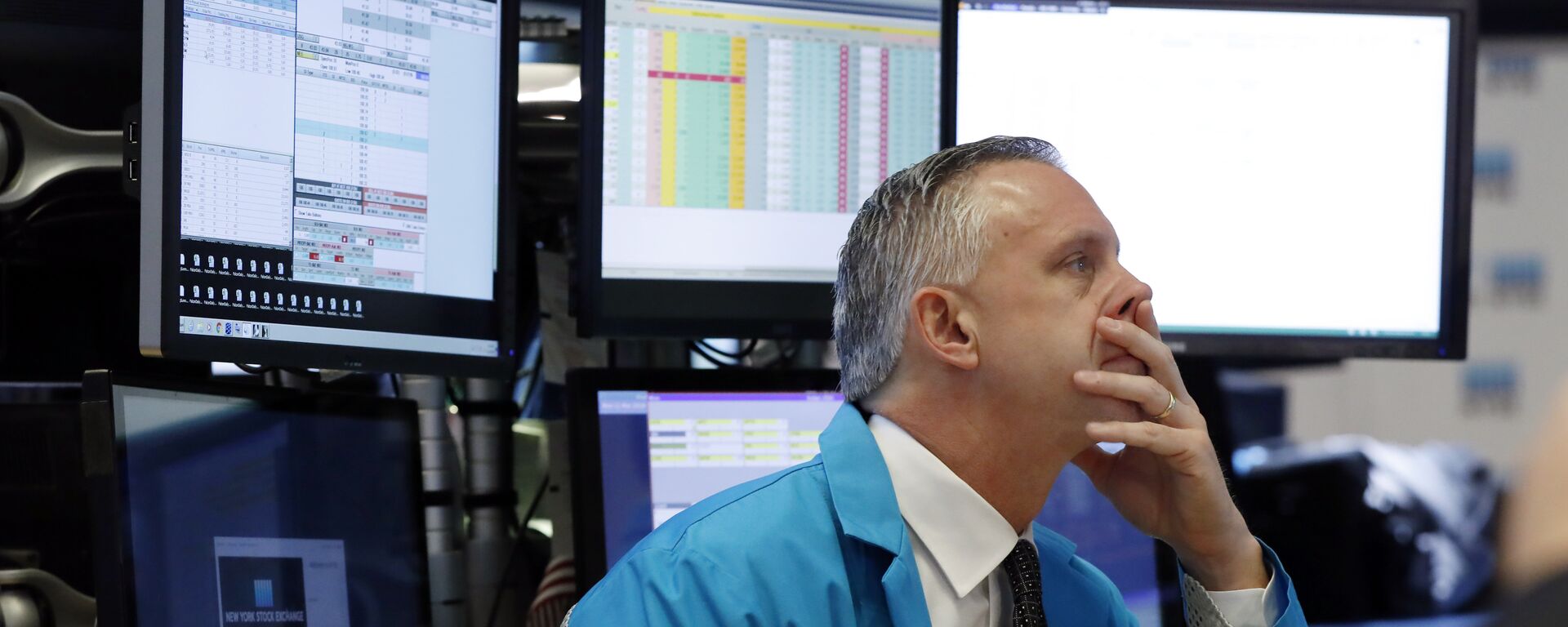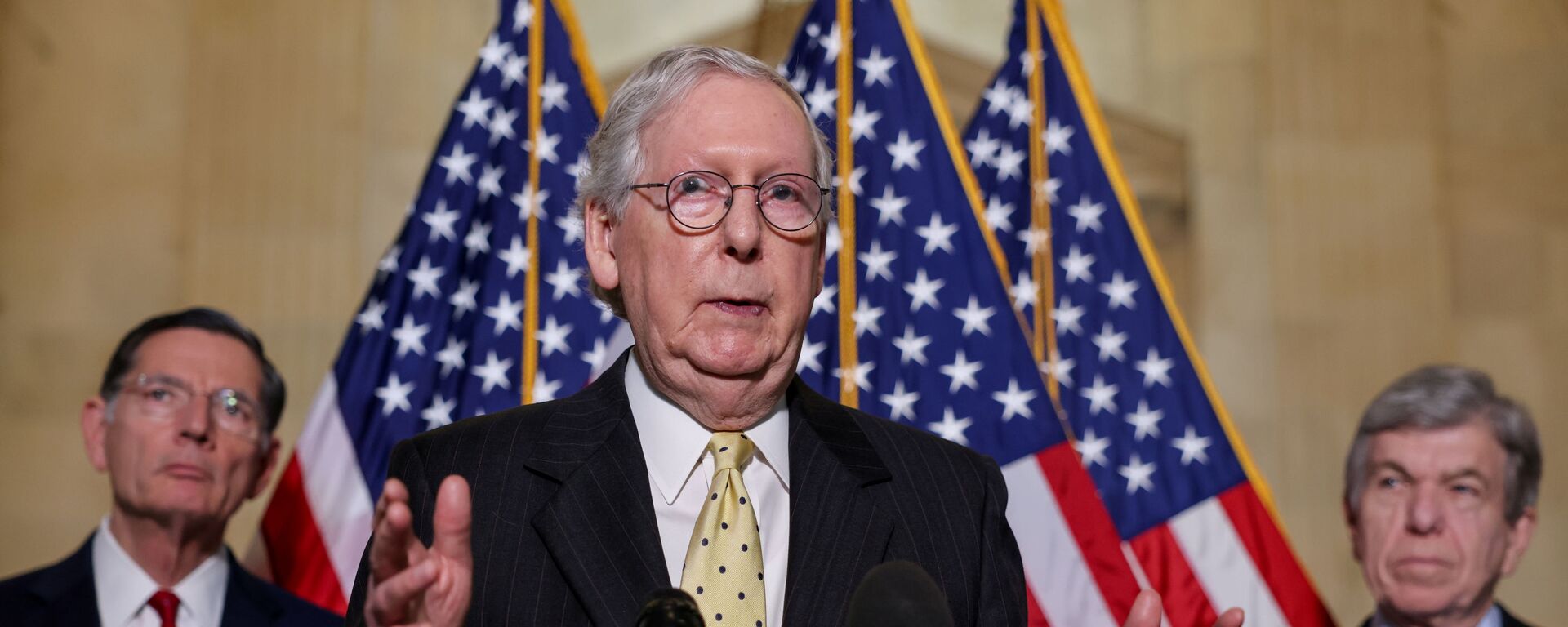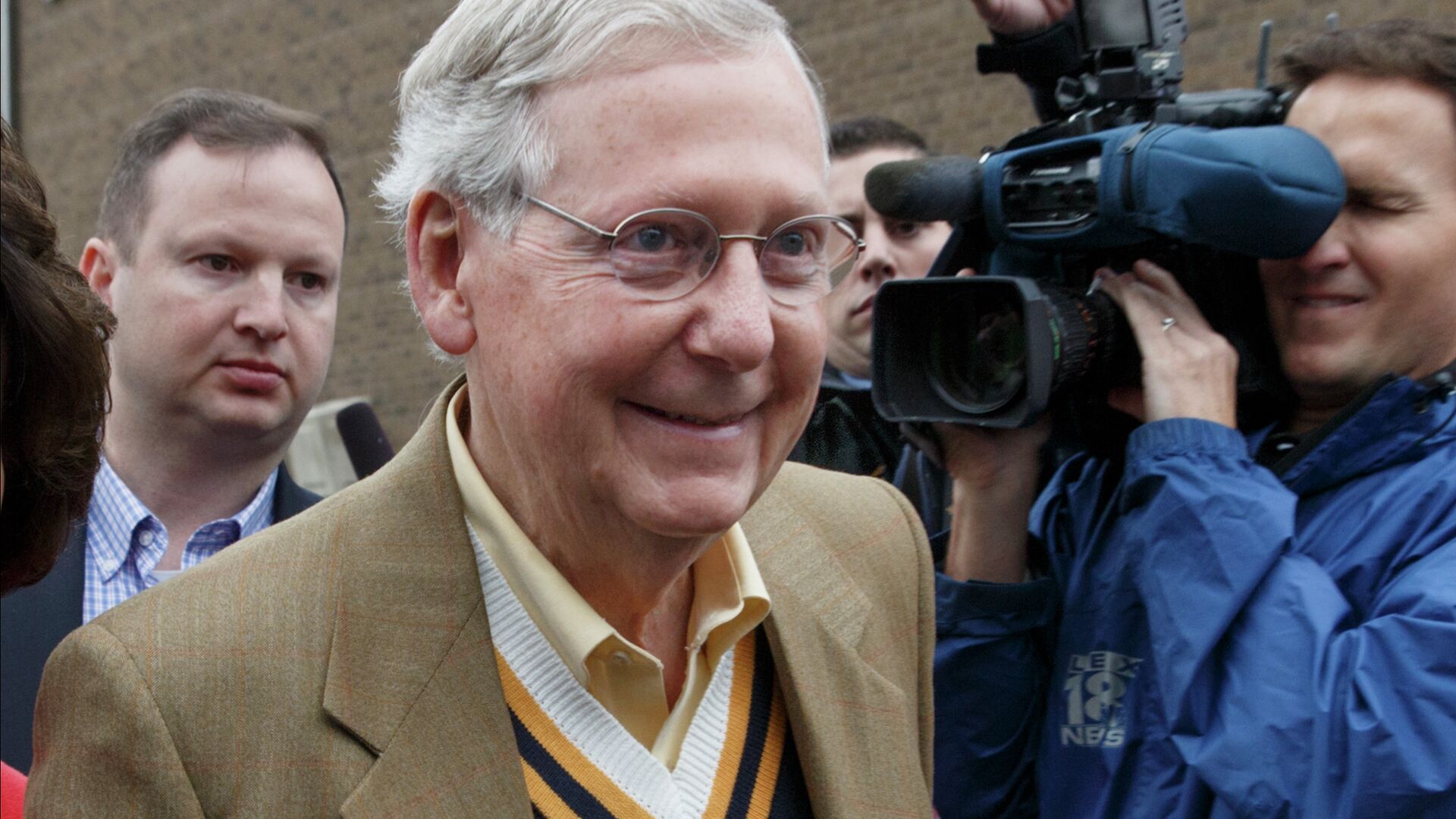https://sputnikglobe.com/20211015/mcconnells-trap-is-gop-using-looming-default-to-gain-political-scores-ahead-of-2022-midterms-1089954342.html
McConnell's Trap: Is GOP Using Looming Default to Gain Political Points Ahead of 2022 Midterms?
McConnell's Trap: Is GOP Using Looming Default to Gain Political Points Ahead of 2022 Midterms?
Sputnik International
On 14 October, President Joe Biden signed legislation temporarily raising the government's borrowing limit to $28.9 trillion. The law has only raised the debt... 15.10.2021, Sputnik International
2021-10-15T17:23+0000
2021-10-15T17:23+0000
2022-12-19T13:59+0000
mitch mcconnell
chuck schumer
newsfeed
world
us
opinion
gop
default
spending
republicans
https://cdn1.img.sputnikglobe.com/img/101427/37/1014273727_0:252:2216:1499_1920x0_80_0_0_9aca65dc1d6372c420d0d3aec8357bc8.jpg
The latest increase of the debt limit was made possible after Senate Minority Leader Mitch McConnell reached a compromise with the Dems after a partisan standoff. Although some Democratic – as well as Republican observers – rushed to announce that McConnell caved in, National Review suggests that it was nothing but a political manoeuvre on the part of the GOP. Previously, the Republicans blocked the Dems' initiative to raise the debt ceiling, urging their political opponents to pass it through a reconciliation mechanism on their own. However, the Dems don't want a party-line vote on the debt limit, fearing that it would make them vulnerable to the GOP's attacks ahead of the 2022 midterm elections.In reality, McConnell "has made the Democratic bind a little tighter" as his decision "reduces the odds of default, takes away a Democratic excuse for not taking the time to pass their own long-term debt-limit increase, and pops the Democratic trial balloon of weakening the filibuster to pass a debt-limit increase", according to the magazine. "Republicans, naturally, want the attack-ad opportunities and the votes".Default is Not an OptionIn December, Democrats may find themselves choosing between a potential default and a politically harmful decision to suspend the limit through a reconciliation party-line vote.A potential technical default doesn't seem like a good option; earlier this month, Secretary of Defence Lloyd Austin warned that it could backfire on the country's security. The Pentagon would be unable to pay service members, civilians, or contractors should the US default on its loans.Needless to say, American financial markets will tank if the US hits the debt limit, Riedl notes: "The stock market will fall; there'll be some degree of chaos in the United States; and that would certainly affect the image of the president in the US on a global scale"."The positive side is one would assume that this chaos wouldn't last very long and would scare Congress into raising the debt limit very quickly", he adds.It's unlikely that American lawmakers would risk dragging the country into default and markets know this, presumes Joseph Gagnon, senior fellow at the Peterson Institute for International Economics and a former visiting associate director of the Division of Monetary Affairs at the US Federal Reserve Board.Who Will Cave in First?The question arises as to who will blink first: either the Democrats will utilise the reconciliation instrument and raise the debt ceiling on their own in December, or the Republicans will join their political opponents to suspend debt limits.Biden previously called the Republicans "reckless and dangerous" over the congressional impasse on raising the government's borrowing limit. After the Dems and GOP reached a compromise on a temporary extension of the debt ceiling, Senate Majority Leader Chuck Schumer blasted his Republican counterparts in a speech:"America's full faith and credit must never be used as a political bargaining chip", he said. "I hope my Republican colleagues relent from trying to make it one when we revisit this issue soon".Nevertheless, it's possible that the GOP won't buy into Schumer's rant since it's the Dems, not the Republicans, who risk the most.The congressional debate over a long-term extension of the debt limit "has been pushed two months closer to the midterms", highlights National Review. While the Democrats have a number of options for avoiding default, the GOP appears to have the upper hand in the political game, according to the magazine.
https://sputnikglobe.com/20210930/debt-ceiling-how-political-uncertainty-hurts-us-international-credibility--financial-stability-1089557007.html
https://sputnikglobe.com/20210929/why-gop-has-good-reasons-to-block-dems-bill-to-raise-debt-ceiling--avert-government-shutdown-1089523704.html
Sputnik International
feedback@sputniknews.com
+74956456601
MIA „Rossiya Segodnya“
2021
News
en_EN
Sputnik International
feedback@sputniknews.com
+74956456601
MIA „Rossiya Segodnya“
Sputnik International
feedback@sputniknews.com
+74956456601
MIA „Rossiya Segodnya“
mitch mcconnell, chuck schumer, newsfeed, us, opinion, gop, default, spending, republicans, technical default, debt ceiling, democrats
mitch mcconnell, chuck schumer, newsfeed, us, opinion, gop, default, spending, republicans, technical default, debt ceiling, democrats
McConnell's Trap: Is GOP Using Looming Default to Gain Political Points Ahead of 2022 Midterms?
17:23 GMT 15.10.2021 (Updated: 13:59 GMT 19.12.2022) On 14 October, President Joe Biden signed legislation temporarily raising the government's borrowing limit to $28.9 trillion. The law has only raised the debt limit until December and has not solved the looming default problem. What game are the Dems and GOP playing ahead of the 2022 midterms?
The latest increase of the debt limit was made possible after Senate Minority Leader Mitch McConnell reached a compromise with the Dems after a partisan standoff. Although some Democratic – as well as Republican observers – rushed to announce that McConnell caved in,
National Review suggests that it was nothing but a political manoeuvre on the part of the GOP. Previously,
the Republicans blocked the Dems' initiative to raise the debt ceiling, urging their political opponents to pass it through a reconciliation mechanism on their own. However, the Dems don't want a party-line vote on the debt limit, fearing that it would make them vulnerable to the GOP's attacks ahead of the 2022 midterm elections.
In reality, McConnell "has made the Democratic bind a little tighter" as his decision "reduces the odds of default, takes away a Democratic excuse for not taking the time to pass their own long-term debt-limit increase, and pops the Democratic trial balloon of weakening the filibuster to pass a debt-limit increase", according to the magazine. "Republicans, naturally, want the attack-ad opportunities and the votes".
In December, Democrats
may find themselves choosing between a potential default and a politically harmful decision to suspend the limit through a reconciliation party-line vote.
A potential technical default
doesn't seem like a good option; earlier this month, Secretary of Defence Lloyd Austin warned that it could backfire on the country's security. The Pentagon would be unable to pay service members, civilians, or contractors should the US default on its loans.
"It's going to significantly damage morale in the US military", says Brian Riedl, a senior fellow at the conservative Manhattan Institute for Policy Research. "It's going to probably limit enlistments in the future, and all of that will be noticed globally and by other countries, absolutely. They will see that the US military is dealing with some chaos and low morale and eventually may have fewer enlistments in such a situation".
Needless to say, American financial markets will tank if the US hits the debt limit, Riedl notes: "The stock market will fall; there'll be some degree of chaos in the United States; and that would certainly affect the image of the president in the US on a global scale".

30 September 2021, 19:00 GMT
"The positive side is one would assume that this chaos wouldn't last very long and would scare Congress into raising the debt limit very quickly", he adds.
It's unlikely that American lawmakers would risk dragging the country into default and markets know this, presumes Joseph Gagnon, senior fellow at the Peterson Institute for International Economics and a former visiting associate director of the Division of Monetary Affairs at the US Federal Reserve Board.
"It seems to me the fact that they could reach an agreement, it confirms in the market that they're always going to reach an agreement", Gagnon says. "Now, obviously, if in the future they don't agree and there's some default, that would change everything, but I don't believe the market thinks that's ever going to happen. A default on US government obligations would be catastrophic for the market. I think that's why it will never happen".

29 September 2021, 17:07 GMT
The question arises as to who will blink first: either the Democrats will utilise the reconciliation instrument and raise the debt ceiling on their own in December, or the Republicans will join their political opponents to suspend debt limits.
Biden previously called the Republicans "reckless and dangerous" over the congressional impasse on raising the government's borrowing limit. After the Dems and GOP reached a compromise on a temporary extension of the debt ceiling, Senate Majority Leader Chuck Schumer blasted his Republican counterparts in a speech:
"America's full faith and credit must never be used as a political bargaining chip", he said. "I hope my Republican colleagues relent from trying to make it one when we revisit this issue soon".
Nevertheless, it's possible that the GOP won't buy into Schumer's rant since it's the Dems, not the Republicans, who risk the most.
"[The Democrats are] the party that has control of the Congress and the White House", says Gagnon. "So they're the party that would be blamed if anything went wrong".
The congressional debate over a long-term extension of the debt limit "has been pushed two months closer to the midterms", highlights National Review. While the Democrats have a number of options for avoiding default, the GOP appears to have the upper hand in the political game, according to the magazine.




